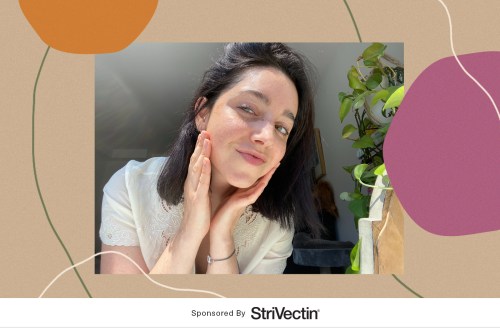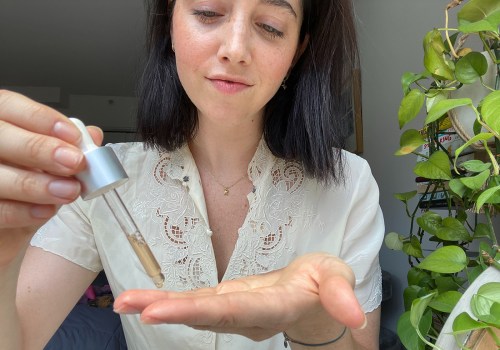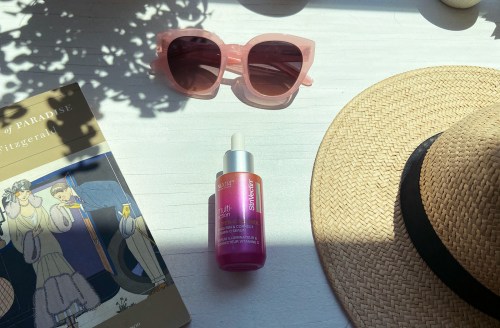Our editors independently select these products. Making a purchase through our links may earn Well+Good a commission
Here’s Exactly How Minimalistic You Can Make Your Anti-Aging Skin-Care Routine, According to a Derm
Beauty editor Rachel Lapidos sits down with dermatologist Caren Campbell to figure out how to create a minimalistic anti-aging skin-care routine.

You’re on a mission to preserve your youthful radiance for as long as humanly possible. (Aren’t we all?) But the idea of being stuck at your sink going through the way-too-many steps of a typical anti-aging skin-care routine makes you want to give up before you’ve started. Sound relatable?
Well+Good beauty and fitness editor Rachel Lapidos likes her skin-care routine as much as the next gal who’s basically dedicated her life to trying new products. But when she recently turned 32, her focus shifted, and she began wondering just how minimal she could make her anti-aging skin-care routine—while still scoring the youth-boosting benefits.
Lucky for her, San Francisco-based board-certified dermatologist Caren Campbell, MD is totally here for the simplified approach to skin care, at any age.
“I think there is a [drawback] to having too many steps to your skin-care routine,” Dr. Campbell says. “These 20-step beauty plans leave no room to breathe in your life, and right now […] the last thing we need is a multi-step, stress-inducing, expensive skin-care routine.” Is she reading our personal journals, or…?
“Evidence-based aka scientific-based skin care shows we only need what I call my holy trinity: sunscreen, retinoid, and antioxidants.”
That’s exactly why Lapidos wanted to clear out her full-to-bursting beauty cabinets, Marie Kondo style, and instead hone in on specific ingredients to target her specific needs. “Evidence-based, aka scientific-based, skin care shows we only need what I call my holy trinity: sunscreen, retinoid, and antioxidants,” Dr. Campbell says. (It’s that simple?)
The secret weapon Lapidos started with? StriVectin Super-C Retinol Brighten & Correct Vitamin C Serum, which combines two of the three ingredients in Dr. Campbell’s holy trinity into one product (talk about streamlining). It also contains NIA-114, a patented form of niacin (vitamin B3), and hyaluronic acid—two other ingredients Dr. Campbell recommends including in your routine, but more on that later.
Uniting the brightening and antioxidant power of vitamin C with the firming and smoothing magic of retinol, the serum helped her ditch a step in her routine while still giving her skin the renewed, dewy boost she was after. Plus, the lightweight serum is non-tacky, helping it absorb quickly so she could layer it with moisturizer and makeup on the days she wasn’t showing off her fresh-faced complexion (which she does most days, tbh).
PSA: If you thought retinol and vitamin C couldn’t be used together, Dr. Campbell gave her two cents on the way around that myth: “Stability testing needs to be performed in a lab to ensure that the ingredients are still effective,” she says. In the case of Super-C Retinol Brighten & Correct Vitamin C Serum, it uses two forms of stabilized vitamin C, and participants in an independent clinical study who used it twice a day for six weeks demonstrated no skin irritation. Science, FTW.
That experience held true for Lapidos, too: “Even with both superstar active ingredients, my skin doesn’t experience any redness or irritation with it at all,” Lapidos says. “Ever since I started applying it twice a day, my skin has looked more even and glowy—as if it’s been drinking all of its vitamins, which, basically, it has.” The proof is in her complexion.
To get her routine in super simplified shape, Lapidos picked Dr. Campbell’s brain for more derm-approved ways to minimize steps while maximizing the youthful benefits of her new regimen.
Keep reading for a glimpse into beauty editor Rachel Lapidos’ conversation with a derm on how to condense her anti-aging skin-care routine.

Lapidos: Asking for a friend, but how old is too old to start an anti-aging routine?
Dr. Campbell: The aging process starts very early. At age 30, we start to lose a tablespoon of fat off our face. The fat loss results in shadows on the face that make us look older. Collagen and elastin, which are the building blocks of the skin that keep it looking youthful and wrinkle free, also start to break down.
In your 20s and 30s, you should start using the other aspects of my holy trinity: your antioxidant and retinoid, in addition to your sunscreen. Antioxidants make sunscreen work better, and fight the breakdown of the building blocks of the skin. Retinoids help to build back up the building blocks of the skin—collagen and elastin.
Lapidos: You said earlier that antioxidants are part of the “holy trinity.” Does vitamin C count?
Dr. Campbell: Vitamin C is an antioxidant meaning it fights free radical damage. Just like you would eat blueberries or other antioxidant-rich foods, you apply vitamin C serums topically to fight oxidative stress from sun and pollution. By fighting free radicals, they prevent breakdown of collagen and elastin, again the building blocks of healthy youthful skin. Vitamin C is also a lightener, so it helps prevent and treat sunspots, and helps sunscreen work more effectively.
Lapidos: So, that’s a yes for vitamin C. Why does retinol hold a prestigious spot in your anti-aging essentials?
Dr. Campbell: Very few things applied topically to the skin can signal the body to make more collagen, and more collagen is the goal of any anti-aging routine. Retinoids are the mainstay way to do this topically.

Lapidos: Beyond your holy trinity, what are some other key ingredients I should look for?
Dr. Campbell: As you hit your 40s, you do need to consider AHA/BHA like a glycolic acid wash a few times per week to help with the slower skin cell turnover that results in duller looking skin.
Opt for sunscreens that are mineral, so zinc and titanium, as well as broad-brimmed hats and sunglasses to help with UV protection. Peptides can also be applied topically, and help to build collagen.
Lapidos: Since I’m adding a retinol and eventually an AHA or BHA to the mix, should I switch up my moisturizer, too?
Dr. Campbell: Moisturizers are best kept simple. My favorites contain hyaluronic acid and niacinamide. Hyaluronic acid is the most moisturizing ingredient that can be applied to the skin as it pulls 1,000 times its weight in water. Niacinamide is vitamin B3, and helps also fight oxidative stress, is a mild lightener to help with sunspots, and is an anti-inflammatory agent.
Lapidos: To help me get started, can you give me an example anti-aging skin-care routine you’d recommend to your patients?
Dr. Campbell: In the morning, wash with a gentle soap, use an antioxidant, moisturize (a moisturizer with B3 and hyaluronic acid), use sunscreen—mineral, SPF 30, and broad spectrum.
At night, wash with gentle soap, use a pea size amount of retinoid a few times per week. Start with one to two times a week initially, then every two weeks add a day if you’re tolerating it okay. The strength depends on your skin type and issues. Then, moisturize on top of the retinoid—usually the same as your morning moisturizer.
Sponsored by StriVectin
Photos: Well+Good Creative
Sign Up for Our Daily Newsletter
Get all the latest in wellness, trends, food, fitness, beauty, and more delivered right to your inbox.
Got it, you've been added to our email list.




